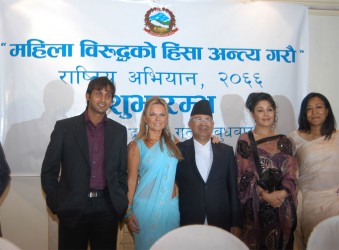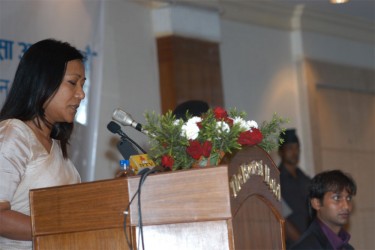
As you may have seen from the press, Geri Halliwell (ex-Spice Girl) was here a few weeks back as a UNFPA Ambassador to help raise awareness of women’s issues in Nepal. While here, Geri helped launch a Violence Against Women campaign together with the Prime Minister of Nepal, visited a number of programmes run by the UN to provide support and protection to abused women, and she also met Sapana Malla, a member of the Constituent Assembly (an MP) and also a powerful and impressive advocate for women’s rights in Nepal.
Violence against women is an incredibly important issue here and it was good to have a celebrity such as Geri to help create awareness both here and abroad about the awful situation that many women in Nepal face, often in their own homes. In fact the more I get to learn about the position of women here in Nepal, the more shocked I become. I recently learned that the number one cause of death for women of reproductive age is suicide. That’s a truly dreadful statistic and we don’t know enough about what lies behind this, but one can assume that these women must have suffered pretty appallingly before they resort to suicide. And unfortunately much of the time victims of abuse or violence, or the victims’ families, have nowhere to turn for help, safety or support.
Let me tell you a very tragic, true story that happened just the other week, very close to home.
A colleague of mine was approached by her housekeeper whose sister had come to her very upset because a neighbour’s 12-year-old daughter had been found raped and murdered earlier that day. The girl was from a poor family, and the family believed the perpetrator was their wealthy landlord’s son because he had abducted her a few days earlier. The family were trying to contact the landlord to talk to him about the abduction, but had not been successful.
It is important here to emphasise how rich and powerful landlords in Nepal can be and how poor and powerless the tenants. After the girl had been missing for 3 days her parents found her body in nearby woodland. They went to the police to file a report, but the police initially refused. Then they changed their minds and agreed, but only if the family paid them a large amount of money (which they did not have). It was at this point that the housekeeper went to my colleague and asked for help.

My colleague called Sapana Malla, the MP and women’s advocate I mentioned earlier, and asked for help. They went early the next morning to the police station. Once confronted by Sapana and her team, the police then filed a report with no payment from the family. The next day, the suspect (and a friend) were arrested and the police were saying that they would not be allowed bail as the charge was so serious.
In this case, Sapana and her team will continue to provide support to the victim’s family. Obviously it will not bring the little girl back, or undo the dreadful crime, but it does mean that the family have a chance at some form of justice, which it looks unlikely they would otherwise have had.
It is women like Sapana and her team who we in DFID want to support more, so that they can help more families like this, and try to remove the sense of impunity that exists. We are looking at how we can increase local level support, maybe through training to police stations, maybe through support to local level legal centres, where people can go in cases such as these. Poor people otherwise have very few options and, if it hadn’t been for the housekeeper’s plea for help, in this case also the family may have had nowhere to turn.

3 comments
Comment by Mochi Sada posted on
Dear Sarah,
Your opinion and spirit to support helpless people can not be challenged. Definitely, the first thing is to preserve and promote humanity. The ill event you mentioned is Nepal's day to day reality and it is less to only condemn this. But my objective is not to praise you or any super hero (heroine) who evacuate people from trouble. Let's try to see another side of the coin.
In the name and spirit of poor people or justice to them, donors have been producing super human in Nepal for last many years. This is not new thing. Unfortunately all these super human (hu..woman)........sorry for gender insensitivity! are from landlord family. After well education, they incarnate as a god or goddeses for helpless and poor with support from donor organizations. They, on behalf of the poor and excluded, fight against the injustice. And in most of the examples these types of cases are settled finaly following the 'give and take policy' in a dramatic manner. The super hu(wo)man continues his/her shop in searching of new cases.
Respected Sarah, can you show me any other 'super hero or heroine' from Musahar, Bantar, Kusbadiya, Bankariya, Chepang, Hayu, Raji, Jhangad or other most disadvantage communities? Who fight their own struggle? Have you supported to empower these people? Have you thought why Nepal is still most poor country and not moving ahead? If no, then look at yourself. You might be engaged or circled with many Nepali feudals and landlords. So, pls stop ornamenting and decorating new god and goddesses. This world doesn't require more god and goddesses. It requires general men and women who think and do work to make this world more beutiful and just.
Comment by Gus Neupane posted on
Dear Sarah.
This is Gunjeswar(Gus), still a nepalese but living in UK. Thank you for the blog on women issues and certainly this is an area to look to. Can I say thank you for the good work you are doing in Nepal. As a person I would not expect a big change because of the donner alone and the key is the government policy and how effective they are in implementing those policy issues. But unfortunately, I am sure you know by now, the government is still lack the policy and commitment in political part though they speak nice. Still they run after petty interests and corruption so that they can elect next time. This power game bringing people nowhere and ppl should beg donnation from outside always, bleak future still there.
So far women issues are in Nepal, it is the combination of factors- one is women are still lack education, early marriage, dependent with parents or husband and lack of systematic support group (though there few support groups in the country, I am a bit agree with Mochi Sada there, that they are unknown to many and they lack committment because some of them are run by ppl of feaudalistic mind or by landlord attitude mentality though they may be good in talking! I hope you will recognise such people when they approach for funding!! I have nothing to say about Sapan's contribution but I do think country needs more centre like UK style Citizen Advice Bureau with refugee facility for emergency support for those of victim of this ill treatment. And I do suggest you to co-ordinate such Bureau for few years and may be hand over partially to government later. You can look the exit strategy always.
Anyway Keep doing your good work. Look forward to hearing more from you. Thank you xxx
Comment by Dr. Uma Shrivastava posted on
Dear Sarah
I am a Reproductive endocrinologist, practicing infertility care for
more than 17 yrs. at Infertility Centre Bijulibazar Kathmandu.
In this country when I see an infertile couple after complete invstigation, the problem in men is declared, even then the women are being turtoured for not being able to conceive.
The sex selection is another pathetic story. Recently, a couple came if I can help them to have a son. The woman said crying that the desire of a male child in the family is so much that her own two daughters asked her father to re-marry so that they can have a brother in the family. How can you change this attitude please let me know.
Thank you
Uma